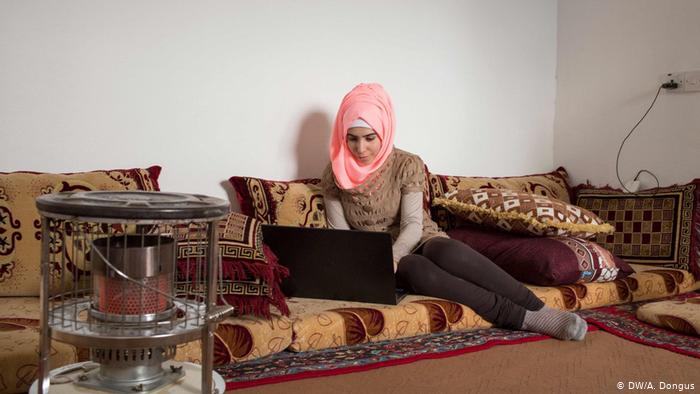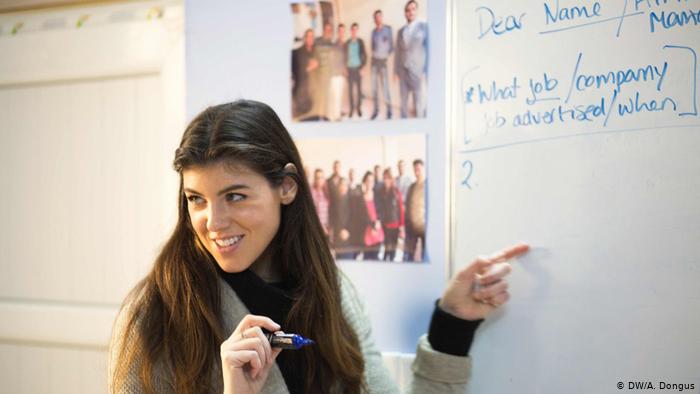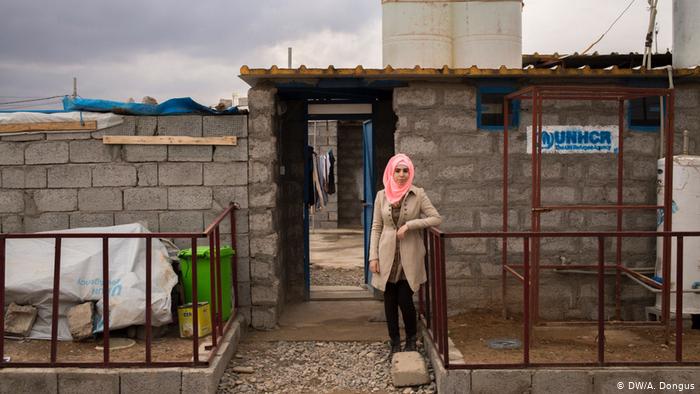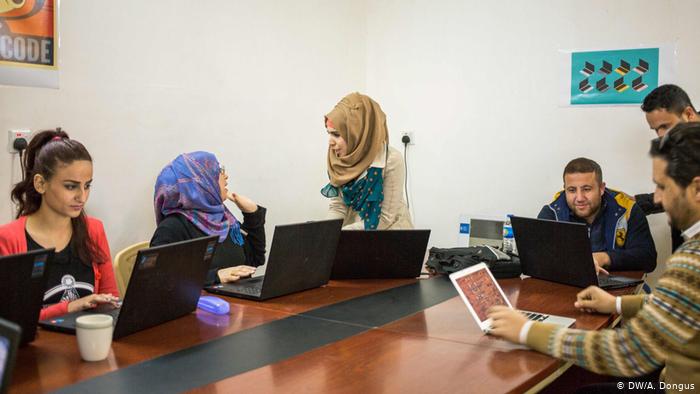Not far from the conflict in northern Iraq, refugees are studying for their digital future. The IT concept aims to help them out of unemployment with computer skills. Ariana Dongus and Christina zur Nedden report.
When Goory Al-Hamed fled from Damascus, she didn’t think twice about what to take along: a few clothes and her laptop – not knowing that it would soon become her most important asset.
Now, just over three years later, the 27-year old woman sits on a pillow in a refugee camp South of Irbil, the Kurdish capital of Northern Iraq, her laptop in front of her, next to her a little gas oven, the only heat source on this cold morning. Goory quickly types out a programming code. Her web application prototype is almost finished. But then the light goes out with a bang: another power cut. Goory shuts down the laptop and leaves the shanty. She passes the white tents of the UN refugee agency, the football field, the mosque and the Iraqi security guards‘ office and walks out of the camp. A few minutes later, the bus arrives that takes her to the programming school.
„Re:Coded“ is located in a plain house on Irbil’s outskirts. Just over an hour’s car journey away from the programming school, the Peshmerga are fighting alongside the Iraqi Army in Mosul against the the „Islamic State“ (IS) group.
Coding for the future
Here, Goory is training to be a software developer, not in a conventional university program that runs for several years, but quickly and intensely within eight months. When the program started last July, 500 refugees applied. She passed the test and is now one of 40 students that receive an education for free. Only a few had prior knowledge in coding.

For the founder of the school, Alexandra Clare, this was not an obstacle. Before she moved to Irbil, the 29-year-old Australian lived in New York. When she traveled to Irbil as an employee of the United Nations in 2015, she realized there were hardly any educational programs for refugees. „When I asked the people what they want to learn, most of them said: English and computer skills,“ Clare says. She knew about the globally growing demand for software developers. And in the US, she had witnessed the rise of private „coding boot camps.“ She connected the dots and founded Re:Coded, a coding school especially for war refugees. The UN supported her with $250,000 (228,000 euros) for the first year, Google later donated another $25,000.
Goory is among the most ambitious students at Re:Coded. At Qushtapa camp, she shares a 24-square-meter room in a shanty together with her family. In winter, the temperatures drop below zero; electricity is only available for a few hours a day. Her classmates have, like Goory, all fled from war and terror. They come from Bagdad, Mosul or Fallujah and live in camps or sparsely equipped apartments in the city. For them, Irbil is the first safe place after years on the run.
Programming for peace

Re:Coded is supposed to teach more than just coding. „It is a peace-building project,“ says Clare, who studied law and international relations and has worked for Human Rights Watch. The message of Re:Coded is to help solve the refugee crisis with the power of technology and coding. To make her ideal come true, Clare transplanted the concept of a US „coding boot camp“ to Iraq. The curriculum comes from a private programming school based in New York. Every student has a mentor, who either works for Amazon, Facebook or Google in North America and who once a week communicates via Skype with his or her student. Another mentor practices English with them, as only good language skills enable students to be competitive as freelancers in the global online labor market.
The idea is to quickly provide refugees with work – not as fruit sellers, hairdressers or bricklayers, but as programmers for foreign companies. That was Clare’s master plan. „The Re:Coded program was designed to meet the market demand in the US and Western Europe,“ she says and approached US, Australian and German businesses. She spoke openly about the fact that refugees work for a smaller salary than programmers in India or the Philippines, because any amount of money is better than no money or relying on donations from humanitarian organizations.
An online platform, where Re:Coded graduates can apply for jobs, is currently being set up for Iraq by Microsoft Philanthropies. The project aims to absorb „the unemployed talent of young software developers in the country“ and get the young generation out of poverty. Whether the Silicon-Valley giants really want to solve the refugee crisis or whether their mini-investments in a crisis region is just good PR remains to be seen.
Constant constraints
Clare knew from the beginning that her students would most likely have to stay in northern Iraq. Her concept is based on remote work. Leaving the country is too expensive for most of her students or has been made almost impossible by US President Donald Trump’s travel bans for people from predominantly Muslim countries. The intense school program is supposed to turn traumatized, intelligent people into digital nomads who then independently make money with their laptop. Not in a café in San Francisco, but in a refugee camp in Northern Iraq, where people are massively limited in their right of free movement.
Initially, the program was supposed to run five days a week, but economic and family constraints quickly cut that down to three days. Throw in the ongoing war against IS and the nearly two million refugees seeking protection in the and it becomes clear that there are other priorities.
Alexandra Clare was due to leave northern Iraq not long after her class graduated in April. She will no longer teach refugees in Irbil but wants to open a new coding school for refugees in Istanbul and has similar ideas for schools in Gaza, Greece and Lebanon.

Goory Al-Hamed in contrast will have to stay in Irbil. The Re:Coded graduates might get a co-working-space in order to compete for programming jobs on their own. Out of need and not because it is a hip lifestyle.
This piece was first published on Deutsche Welle
